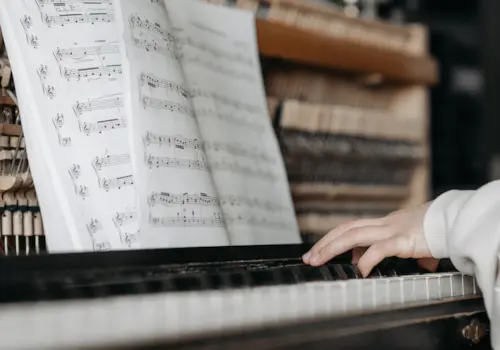We’ve come up with 7 different ways in which you can encourage your piano students to practise more at home
We will all have experienced that moment when a student comes to their weekly lesson having not touched the piano for the past week.
Motivating students to practise enough at home between lessons is a difficult task, but there are plenty of things we can do to try and raise that motivation within our students. That being said, every student will be different when it comes to their work ethic and their preferred way of learning.
So, with that in mind, we’ve come up with 7 different ways in which you can encourage your piano students to practise more at home.
1. Develop a personal interest with each student

The one thing that always remains a constant in the development of a pianist’s progress is their relationship with their teachers.
I've noticed that I've performed better with teachers that have taken an interest in bands that I enjoy or composers that I enjoy.
This is an easy win for any teacher to do, and it will also greatly aid in the success of your students' lessons.
It can be something as simple as going out of your way to learn a song by their favourite band or composer, and finding the sheet music for them. This can have a serious impact.
Perhaps also try proposing the idea of your student learning one of their favourite songs for you two to perform as a duet. Immediate gains in your relationship with your student as well as their overall progress is so important.
2. Teach them the basics of improvisation

Improvisation is something that I've seen work wonders for certain students. While this usually works best for students who have been playing for a couple of years, this is still an extremely effective learning tool for any pianist of any level.
If your students are struggling with the weekly material and losing ambition, sometimes a look into the wonderful world of improvisation can be just what they need. Here are two suggestions:
✔ Introduction to 'fake books'
What exactly are fake books, and why are they beneficial?
Fake books are books of sheet music that only show the lead melodies in the treble clef. They also provide you with chords on top of the melody.
This not only forces you to learn chords & different key signatures, but it also gets your brain thinking on the fly as you can't see the chord's notes in front of you.
This book below is the first fake book that I used when growing up. It really challenges you. I believe that even classical students can make some great gains from a book similar to this, especially since it will be new and exciting for your students.
*As an Amazon Associate, we earn from qualifying purchases.
✔ YouTube channels that teach improv
A simple search on YouTube will provide you with some great instructional videos on improvisation. I always encourage students to check out piano improvisation channels on YouTube as I believe this will only help them. Try out the video below to start you off.
Why not try out our six-part series, How To Play By Ear? Author and piano teacher John Geraghty shows you how to play the pieces you love, without needing the music, and how to improvise.
One part each features inside issues 109-114.
LEARN HOW TO PLAY BY EAR
3. Talk with parents and come up with a reward system

Certain students will benefit from rewards. While there are a whole host of different ways to conduct a reward system, the best way to do this is to chat with the parents about it first.
If your student is expected to practise 30 minutes a day, come up with an incentive together to encourage them to put in some extra work.
For example, if your student plays for 45 minutes in one day, they could be rewarded with an extra 15 minutes of video game time or TV time, or anything else they might enjoy.
4. A quick video call during the week

With the advancement of technology, it has become very easy to check in on how students are doing.
If your students are struggling with material, this could be a major reason in which they are not finding motivation to practise.
If you notice your student is struggling, a quick check-in during the week to ask how the material is coming along can be very helpful. This also allows for your students to send any questions your way as well. While this is more use of your time, it can greatly enhance your future lessons with that student, thus making it worthwhile.
5. Piano Apps

There are a ton of great piano apps that are fun and interesting for students. From music theory apps to rhythmic skills apps, there is something for every area of piano learning.
Most students nowadays have phones or tablets that they use daily. ABRSM have a number of high quality, critically acclaimed apps for pianists. You can check out a list of them here.
6. Challenge your students to try and learn one of their favourite songs by ear

Learning to play by ear is something that comes naturally to some pianists, but is more difficult for others.
I firmly believe that pushing students out of their comfort zones is something that can really help with their progress.
Allow your student to pick a song they want to learn and set them the challenge of learning the piece off by heart within 2-3 weeks. The piece should ideally be just below their playing level, otherwise it’s going to be very difficult for them!
7. Set up a mini Skype concert
Recitals are always a great way to keep students motivated. Introducing an online concert in which they will take part in is something that will give them an incentive to practise.
Creating a simple signup sheet in which students can choose to participate can be a smart option.
Another way to approach these types of concerts, and make them more entertaining, is to remove the formal nature of concerts.
Allowing students to choose their own pieces and dress how they like is a good way of doing this. Mini concerts are a great tool for breaking up the monotony of everyday material.
In times like these, creating a great online environment for your students is incredibly important. When you combine this with taking a general interest in your students’ progress, this will help bring out the best in them.
Good luck!
Sign up to our email list to be the first to hear all the latest piano news.
This article is written by Chris Senner, keyboardist for the band Vinyl Theatre and the owner of the keyboard blog, Keyboard Kraze. He's been writing music & teaching piano for the last 10 years and is passionate about all things related to keyboards.









